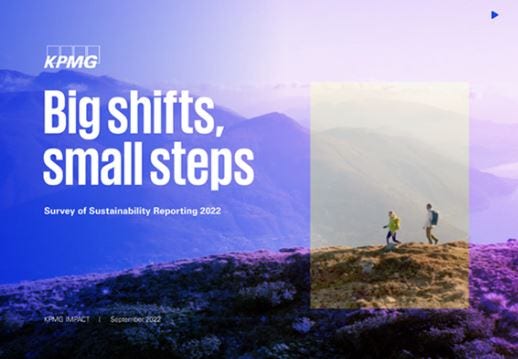The KPMG survey has tracked business adoption of the 17 UN SDGs since its launch in 2015. The SDGs have resonated strongly with business with large leaps in reporting against them between 2017 and 2020.
And yet, we’ve seen only incremental growth in adoption over the past 2 years. The data shows a 2 percent increase of the N100 (to 71 percent) and a 2 percent increase in the G250, where three-quarters of the G250 now report against the SDGs.
Global SDG reporting rates (2017–2022)
N100
G250
Base: 4,581 N100 and 240 G250 companies that report on sustainability or ESG matters
Source: KPMG Survey of Sustainability Reporting 2022, KPMG International, September 2022
Asia Pacific, Latin America remain SDG reporting leaders
In 2022, we see 12 countries, territories and jurisdictions in which 75 percent or more of the top 100 companies reference SDGs in their sustainability reporting. Four of those are in the Asia Pacific region. Thailand led with 93 percent of companies identifying specific SDGs that were most relevant to business.
Even though this strong geographical spread suggests that the SDGs are fully embedded around the world, reporting rates in Eastern Europe (61 percent) and the Middle East (65 percent) can still improve.
In the G250, 100 percent of German companies reference the SDGs. Also impressive is the increasing references to SDGs among Chinese companies, going from 5 percent of companies in 2017 to 56 percent in 2022.
Room for improvement on balanced SDG reporting
In both the N100 and the G250, the vast majority of companies communicate only the positive impacts they have on SDGs, with only one-tenth of N100 companies and one-third of G250 companies considering both positive and negative impacts on SDGs.
The research also showed that more companies are reporting against specific SDGs, with 10 percent of companies reporting against all 17 SDGs. Three SDGs remain the most popular for companies: 8: Decent Work and Economic Growth; 12: Responsible Consumption and Production; and 13: Climate Action. Few companies prioritize the following three SDGs that relate to 2: Zero Hunger; 14: Life below Water; and 15: Life on Land.
Key global trends in sustainability reporting
Sustainability reporting grows incrementally with movement towards the use of standards framed by stakeholder materiality assessments
An impressive 96% of the world’s leading 250 companies report on sustainability, a rate likely to increase as new regulations on non-financial reporting is introduced. Usage of global standards like GRI, SASB, and stock exchange guidelines have also increased, with the GRI the most dominant. A significant majority of reporting companies across both the N100 and G250 disclose their materiality.
Reporting on climate risk and carbon reduction
Increased reporting on climate-related risks and carbon reduction targets, in line with TCFD
Climate reporting is the most common form of disclosure ahead of social impact and governance risk. Nearly three-quarters of companies report their carbon targets and the number of companies reporting against TCFD has nearly doubled, leading to more consistent and comparable climate disclosure.
Reporting the risk from biodiversity loss
Growing awareness of biodiversity risk
2022 is a pivotal year for nature and biodiversity with international efforts stepping up to halt biodiversity loss. Despite growing awareness of biodiversity loss as a critical issue, less than half of companies recognize this loss as a risk to the business. On the positive side, most sectors now acknowledge this risk, even many of those that can be considered low risk. The launch of the Taskforce on Nature-Related Financial Disclosure (TNFD) and Corporate Sustainability Reporting Directive (CSRD) frameworks are expected to drive up reporting across countries and sectors in the immediate years.
Reporting on the UN Sustainable Development Goals (SDGs)
UN SDG reporting prioritizes quantity over quality
The majority of companies report on SDGs, with 10 percent of companies reporting against all 17 SDGs. Three SDGs remain the most popular for companies: 8. Decent Work and Economic Growth; 12. Responsible Consumption and Production; and 13. Climate Action.
Companies increasingly acknowledging ESG issues as risk areas
Climate risk reporting leads, followed by social and governance risks
An increasing proportion of companies acknowledge that climate change is a business risk. However, less than half of companies report on social and governance risks to their business. In general, the description of these risks are overwhelmingly narrative-driven and do not quantify the financial impact on these risks on companies or on society.
Sustainability continues to become a priority for company leadership but there is room for improvement. Only one third of companies in the N100 have a dedicated member of their board or leadership team responsible for sustainability matters. Compensation conditions related to sustainability outcomes for leadership teams are prevalent for only 40 percent of G250 companies.
Survey of Sustainability Reporting

Our people

Jennifer Shulman
Lead Partner Economic Services in Canada, Global Lead ESG Advisory Hub
KPMG International




